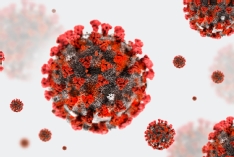Based on initial reports from China, and subsequent evidence that arterial hypertension may be associated with increased risk of mortality in hospitalized COVID-19 infected subjects, hypotheses have been put forward to suggest a potential adverse effects of angiotensin converting enzyme inhibitors (ACE-i) or Angiotensin Receptor Blockers (ARBs). It has been suggested, especially on social media sites, that these commonly used drugs may increase both the risk of infection and the severity of SARS-CoV2. The concern arises from the observation that, similar to the coronavirus causing SARS, the COVID-19 virus binds to a specific enzyme called ACE2 to infect cells, and ACE2 levels are increased following treatment with ACE-i and ARBs.
Because of the social media-related amplification, patients taking these drugs for their high blood pressure and their doctors have become increasingly concerned, and, in some cases, have stopped taking their ACE-I or ARB medications.
This speculation about the safety of ACE-i or ARB treatment in relation to COVID-19 does not have a sound scientific basis or evidence to support it. Indeed, there is evidence from studies in animals suggesting that these medications might be rather protective against serious lung complications in patients with COVID-19 infection, but to date there is no data in humans.
The Council on Hypertension of the European Society of Cardiology wish to highlight the lack of any evidence supporting harmful effect of ACE-I and ARB in the context of the pandemic COVID-19 outbreak.
The Council on Hypertension strongly recommend that physicians and patients should continue treatment with their usual anti-hypertensive therapy because there is no clinical or scientific evidence to suggest that treatment with ACEi or ARBs should be discontinued because of the Covid-19 infection.
Prof. Giovanni de Simone,
Chair, ESC Council on Hypertension
On behalf of the Nucleus Members


 Our mission: To reduce the burden of cardiovascular disease.
Our mission: To reduce the burden of cardiovascular disease.